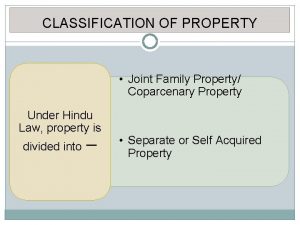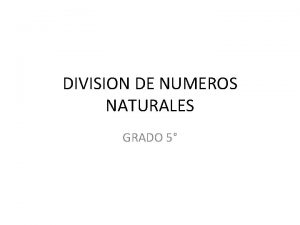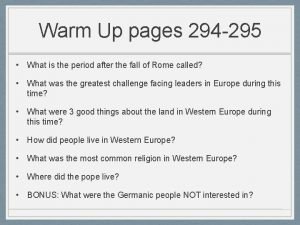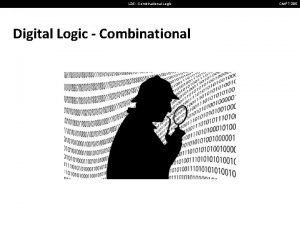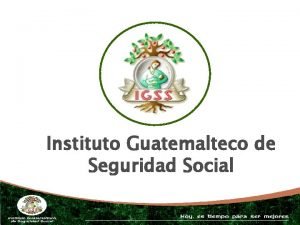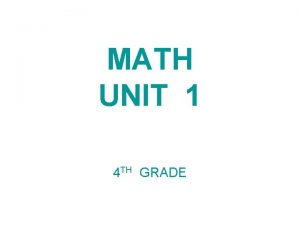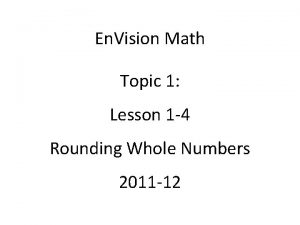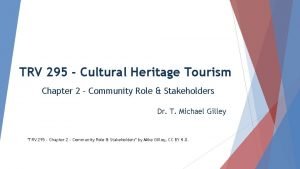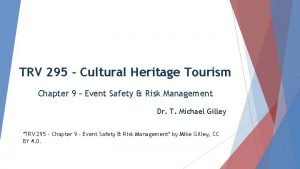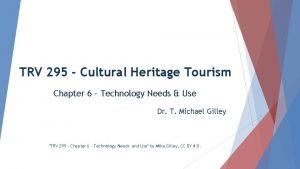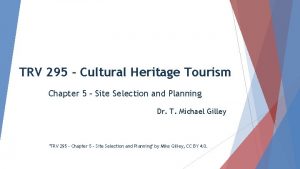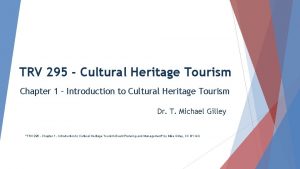TRV 295 Cultural Heritage Tourism Chapter 3 Cultural









- Slides: 9

TRV 295 - Cultural Heritage Tourism Chapter 3 – Cultural Heritage Focus & Contractual Services Dr. T. Michael Gilley "TRV 295 - Chapter 3 – Cultural Heritage Focus & Contractual Services" by Mike Gilley, CC BY 4. 0.

What Will the Cultural Heritage Event Be ▶ Previously we learned that for cultural heritage tourism to be successful, there must be coordination among the community organizations with all stakeholders involved (Gilley, 2016; National Trust for Historic Preservation, 2012). ▶ In this chapter, we will seek a coordinated match between the community and the cultural heritage to be presented, which is another requirement for success with cultural heritage tourism (Gilley, 2016; National Trust for Historic Preservation, 2012). Generally, cultural heritage tourism centers around a historic site such as Jamestown, Old Salem, Shaker Village of Pleasant Hill, Williamsburg, or Yorktown; events such as immigration and Ellis Island the Statue of Liberty, the Japanese and American conflict in World War II and the Pearl Harbor Memorial; a person or people such as Thomas Jefferson and Monticello, George Washington and Mount Vernon, African. American slaves and abolitionists and the National Underground Railroad Freedom Center, the Moravian community of Old Salem, the United States Holocaust Memorial Museum; or unique culture such as jazz of New Orleans, blues of Memphis, quilts and flatfoot dancing of the Appalachian Mountains. ▶ The communities and the cultural heritage tourism named above are connected. Is there a connection between your event and community? What is it?

Community – Cultural Heritage Connection and Authenticity ▶ We also learned previously that cultural heritage tourism is successful when it is authentic (Gilley, 2016; National Trust for Historic Preservation, 2012). ▶ Having a concert venue showcasing jazz as the cultural heritage music of eastern Kentucky is as authentic as showcasing the people of the Appalachian mountains as the stereotypical characters in “Dog Patch”, the fictitious community in the Li’l Abner cartoon by Al Capp. ▶ The cultural heritage being represented in the cultural heritage tourism must be the heritage of the community where it is presented or it is not authentic. For example, the Birthplace of Country Music Museum is in Bristol, Virginia, the “birthplace of country music”. ▶ So again, examine what is the connection between your community and the cultural heritage to be represented as tourism.

Community and Authentic Cultural Heritage Connection = WIN! ▶ If the cultural heritage tourism is authentic to the community where it is presented, the tourism effort is more likely to be successful in the following ways: ▶ the cultural heritage of the community which provides the unique identity and pride of the community is preserved for the enjoyment and use by current and future generations, ▶ the cultural heritage which has and continues to exist in the community and is practiced and presented by the “experts” provides economic development for the current and future generations, ▶ This historic preservation and economic development opportunity is sustainable if planned and implemented by all stakeholders within the community working cooperatively and collaboratively for the benefit of all.

Case Study 1 – Blue Ridge Folklife Festival ▶ The Blue Ridge Folklife Festival is under the Blue Ridge Institute and Museum of Ferrum College. “The Blue Ridge Institute and Museum actively collects photographs, video recordings, audio recordings, books, and documents related to the folklife of the Blue Ridge, Appalachia, and Virginia as a whole” (Blue Ridge Institute and Museum, 2008). ▶ “A heritage-tourism leader, Ferrum College’s Blue Ridge Institute & Museum is a major venue along The Crooked Road: Virginia’s Heritage Music Trail and a guiding player in tourism efforts in the region. In recognition of its accomplishments, the Institute was designated The State Center for Blue Ridge Folklore by Governor Gerald Baliles and the Virginia State Legislature in 1986” (Blue Ridge Institute and Museum, 2008).

Case Study 2 – Home Craft Days ▶ “The first celebration of mountain culture in the region was realized with the establishment of Home Craft Days in 1972. Since that time, the festival has served as an integral part of Mountain Empire Community College’s longstanding commitment to promoting and preserving the rich musical and cultural heritage of Southwest Virginia” (Home Craft Days, 2018). ▶ “For more than 40 years, MECC’s Home Craft Days has featured musicians and artisans from throughout Southwest Virginia, East Tennessee, and Eastern Kentucky. Demonstrations of weaving, pottery making, grist milling, wood crafting, basket weaving, broom making, quilting, tatting and much more are offered, along with musical performances throughout the three-day event” (Home Craft Days, 2018).

Case Study 3: Merle. Fest ▶ “Merle. Fest, considered one of the premier music festivals in the country, serves as an annual homecoming for musicians and music fans. Held on the campus of Wilkes Community College in Wilkesboro, North Carolina, Merle. Fest was founded in 1988 in memory of the late Eddy Merle Watson, son of American music legend Doc Watson” (Merle. Fest, 2018). ▶ “Merle. Fest is a celebration of ‘traditional plus’ music, a unique mix of music based on the traditional, roots-oriented sounds of the Appalachian region, including bluegrass and old-time music, and expanded to include Americana, country, blues, rock and many other styles. The festival hosts numerous artists, performing on 13 stages during the course of the four-day event” (Merle. Fest, 2018). ▶ “The annual event has become the primary fundraiser for the WCC Endowment Corporation, funding scholarships, capital projects and other educational needs” (Merle. Fest, 2018).

Assignment for Week 3 ▶ ▶ Examine the cultural heritage event you have chosen for your case study and ask the following questions of the leaders of this event: ▶ What is the connection between this cultural heritage event and its community? ▶ What efforts are made to ensure that the cultural heritage of this community being presented is authentic? ▶ What efforts are made to ensure that the cultural heritage of this community is conserved and preserved? Please note there is a difference between conservation and preservation of cultural heritage. Research this and address both in your answers for this question. Based upon what you have learned thus far in this class, begin thinking about what recommendations you would make to the Board of this cultural heritage tourism to improve its authenticity, economic impact, and sustainability, and the delicate balance between the three.

Resources ▶ Blue Ridge Institute and Museum. (2008). Blue Ridge Institute and Museum: Heritage Archives. Retrieved from http: //www. blueridgeinstitute. org/heritage. htm ▶ Blue Ridge Institute and Museum. (2008). Blue Ridge Institute and Museum: About. Retrieved from http: //www. blueridgeinstitute. org/about. htm ▶ Gilley, T. M. (2016). Institutions of higher education and cultural heritage tourism: A case study of the Crooked Road, Virginia’s heritage music trail. Ann Arbor: Pro. Quest. ▶ Home Craft Days (2018). About Home Craft Days. Retrieved from http: //www. homecraftdays. org/about/ ▶ Merle. Fest. (2018). About Merle. Fest. Retrieved from http: //merlefest. org/aboutmerlefest/ ▶ National Trust for Historic Preservation. (2012). Cultural heritage tourism fact sheet. Retrieved from http: //www. preservationnation. org/information-center/economics-ofrevitialzation/heritage-tourism/Resources/2011 -CHT-Fact-Sheet-6 -11. pdf
